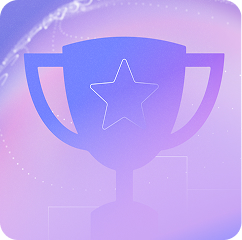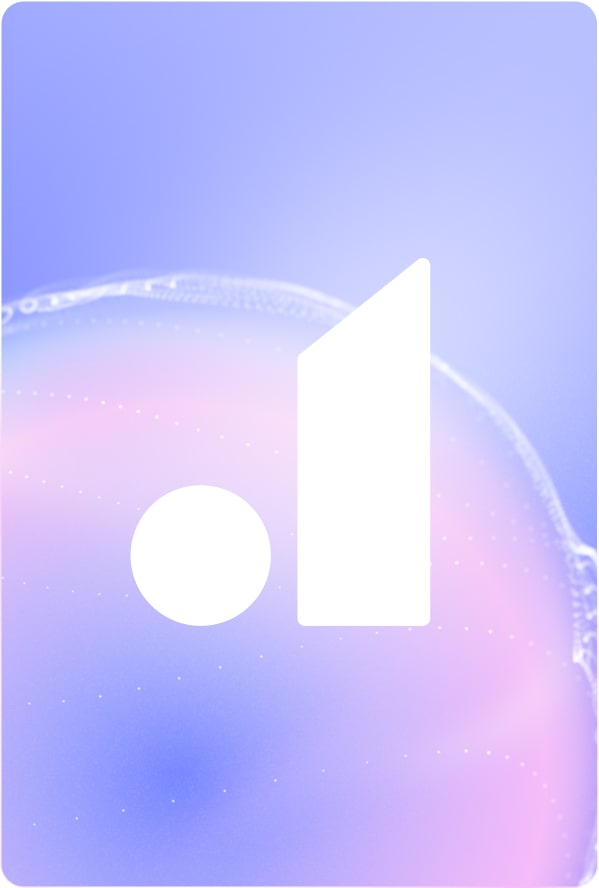
// Recruitment Technology
Salesforce to Atlas Migration: What Agency Recruiters Need to Know
18/08/2025
10 MIN
When you first adopted Salesforce, it was probably seen as a smart investment. As a CRM market leader (customer relationship management system), it is powerful for storing contacts, tracking activity, and managing client pipelines. But for many Salesforce users and recruitment agencies, the reality soon sets in: it is not built for end-to-end recruitment.
Recruiters need speed, automation, and candidate-focused workflows. Salesforce records, while flexible, often require layers of customisation, external apps, or costly development work just to mimic the functionality of an ATS (applicant tracking system). And even then, the experience rarely feels seamless, especially for smaller organisations. Instead of freeing recruiters to focus on placements, it can add user training, unnecessary admin, and slow the process down.
That’s why more agencies are making the move from Salesforce to Atlas. Atlas is an ATS designed specifically for agency recruiters, bringing everything you need into one platform without having to rely on additional database connections to manage your pipeline.
From automated note-taking during calls, to resume (CV) parsing that creates structured candidate profiles instantly, to AI-powered agents that chase feedback and send reminders—Atlas does the heavy lifting so recruiters can spend more time with clients and candidates.
Let’s explore why Salesforce isn’t always the best fit for agency recruitment, what makes Atlas a stronger alternative, and exactly how a migration works. By the end, you’ll know what to expect when moving your agency from Salesforce to Atlas, and why your last migration might just be your smartest one.
Why Salesforce falls short for recruitment agencies
Salesforce is one of the most well-known CRM (customer relationship management systems) in the world. It’s highly flexible, with endless ways to customise fields, objects, and dashboards. That flexibility is its strength—but also its weakness for recruitment agencies.
Recruiters don’t just manage relationships. They manage people, jobs, and placements, all at speed. Here’s why Salesforce often falls short when used as a recruitment platform.
Built for sales, not recruitment
Salesforce is primarily designed for sales teams and customer service operations. This means:
- Candidate pipelines are treated like sales funnels, which rarely match real hiring stages.
- Jobs are stored as “opportunities” or “custom objects,” requiring complex configuration.
- Day-to-day recruiter tasks, such as CV (curriculum vitae) parsing or interview scheduling, aren’t available out of the box.
Heavy dependence on customisation
To make the CRM usable for recruitment, agencies often need:
- Custom Salesforce objects and fields – for candidates, jobs, placements, and activities.
- Third-party plugins – to parse resumes or track applications.
- Developers or admins – to maintain workflows, validation rules, and dashboards.
This results in higher running costs and a reliance on technical staff instead of empowering recruiters directly.
Limited automation for recruiters
Recruitment requires constant communication and admin support. In Salesforce:
- Notes from interviews or calls must be typed in manually.
- Candidate progress has to be updated by hand.
- Feedback from clients often gets lost in long email threads.
This means that Salesforce stores information but doesn’t actively support recruiters in moving candidates forward.
The case for data migration to a recruitment ATS like Atlas
If Salesforce is a general-purpose CRM, Atlas is a specialist tool: an ATS (applicant tracking system) built specifically for recruiters. Instead of forcing recruiters to adapt their workflows to a sales platform, Atlas is designed to eliminate admin and streamline the entire recruitment lifecycle.
Here’s how Atlas helps agencies recruit smarter, not harder.
What is an applicant tracking system?
An ATS (applicant tracking system) is recruitment software built to manage candidates, jobs, and placements. Unlike a CRM that simply stores contacts and activities, an ATS:
- Tracks candidates through every hiring stage.
- Automates repetitive admin tasks.
- Provides built-in tools for sourcing, shortlisting, and client communication.
- Keeps all candidate and client information in one central, recruiter-friendly system.
For agency recruiters, an ATS is the source system and backbone of their day-to-day work.
Atlas features that transform recruitment workflows
Atlas combines the structure of an ATS with the intelligence of AI (artificial intelligence). Key features include:
24/7 AI note taking
- Automatically record and transcribe recruiter calls and interviews.
- Ensures candidate insights are never lost with your AI note taker.
- Frees recruiters from typing while they speak to candidates.
Zero-click resume (CV) parsing
- Extracts key candidate information from CVs in seconds.
- Creates structured candidate profiles without manual data entry.
- Saves hours of admin when processing high application volumes.
Customisable executive search reports
- Generates client-ready shortlists and executive search reports instantly.
- Provides polished, professional documents without needing spreadsheets or manual formatting.
- Strengthens the recruiter’s position as a trusted advisor.
End-to-end AI agents
- Intelligent recruitment assistants that automate follow-ups, chase feedback, and send reminders.
- Reduce candidate drop-off and client “ghosting.”
- Keep jobs moving forward with minimal recruiter input.
Why recruiters choose Salesforce data migration to Atlas
By switching to Atlas, agencies gain:
- Less admin – more time speaking to candidates and clients.
- Automation built-in – no need for expensive third-party tools.
- Recruitment-first workflows – no custom development required.
- Confidence in data – everything from CVs to client notes captured automatically.
For recruiters, this means fewer late nights updating systems and more placements delivered on time.
Migrating data: From Salesforce to Atlas
Step 1: Exporting your Salesforce data
We begin by helping you retrieve your data export from Salesforce. Depending on your configuration, this may include objects like Leads, Contacts, Accounts, Opportunities, and custom records. Data is usually delivered as CSV exports or via a full backup, sometimes accessed through secure download or external storage.
Once you have your export or credentials ready, share them with us. Our team handles the retrieval and ensures data security throughout the process.
Step 2: Uploading into a structured environment
Your Salesforce export is imported into our staging workspace, powered by Amazon Redshift. Here, we unpack your data into structured tables. This gives us a clear view of how Salesforce stored your records and helps us prepare everything for migration.
We identify critical relationships, custom fields, and any areas of inconsistency so they can be addressed early in the process.
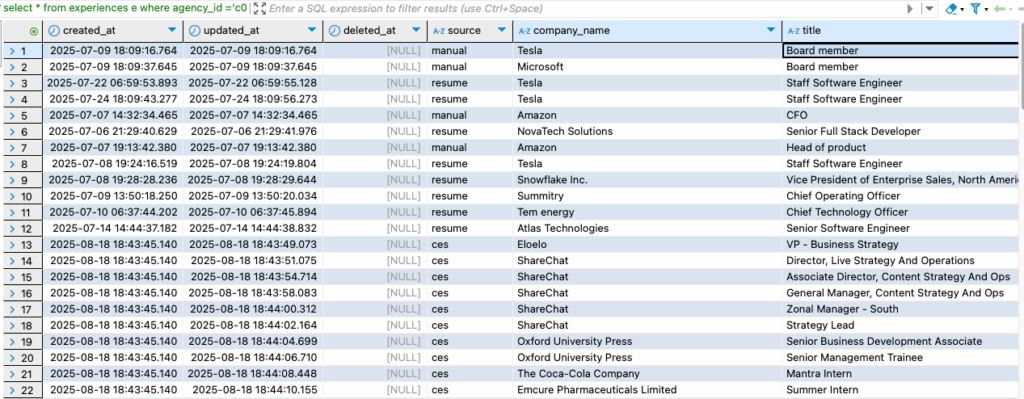
Step 3: Mapping your fields to Atlas
With your data ready, we move into the mapping phase. You’ll use our Migration Dashboard to review your Salesforce fields and align them with Atlas’s data model. We’ll suggest how common and custom objects should be matched to Atlas equivalents.
If your Salesforce setup includes unique fields or workflows, we guide you through custom mapping decisions to make sure no information is lost.
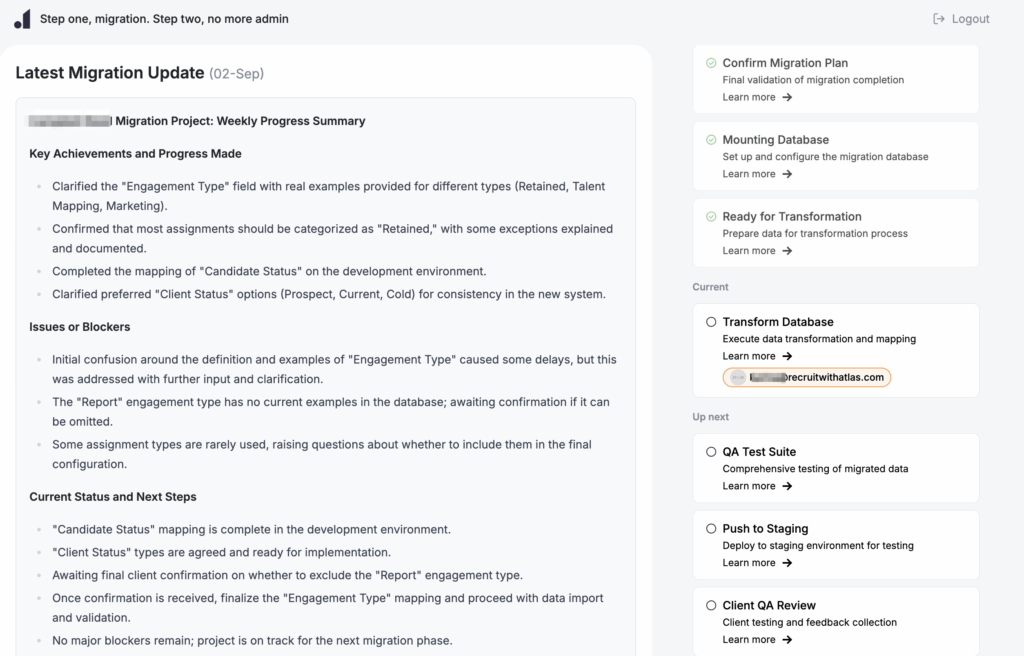
Step 4: Data transformation and cleanup
Once mappings are approved, we transform your Salesforce data using DBT. This includes deduplication, format standardization, timestamp alignment, and applying default values where needed.
Automated scripts handle repetitive cleanup tasks while giving us full traceability. Your Salesforce records are reshaped to match the structure and expectations of Atlas.
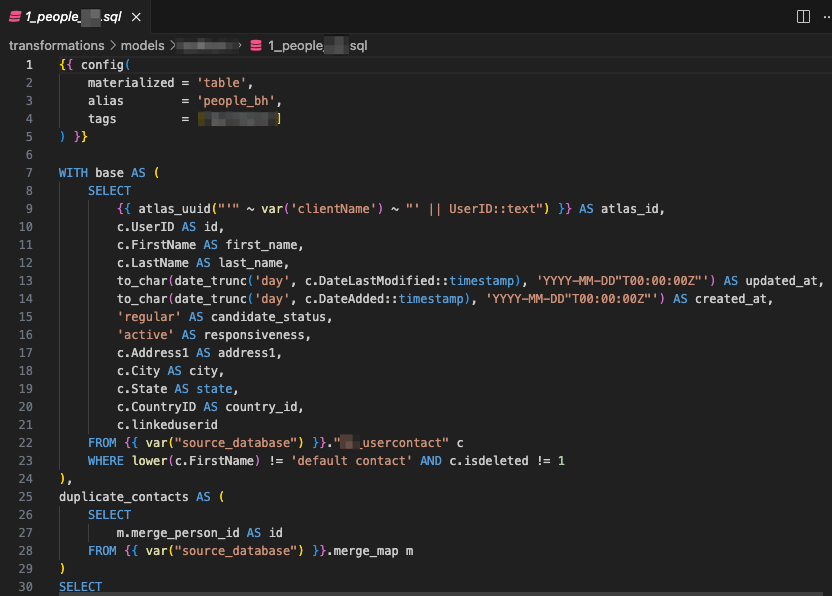
Step 5: QA testing and staging validation
We then perform automated quality checks across your dataset. These tests verify that all required fields are populated, data formats are correct, and there are no duplicate or mismatched records. We also use AI tools to flag anomalies for further review.
After QA is complete, we load the data into a staging version of Atlas. You’ll validate everything using a structured checklist and work closely with our team to resolve any questions.
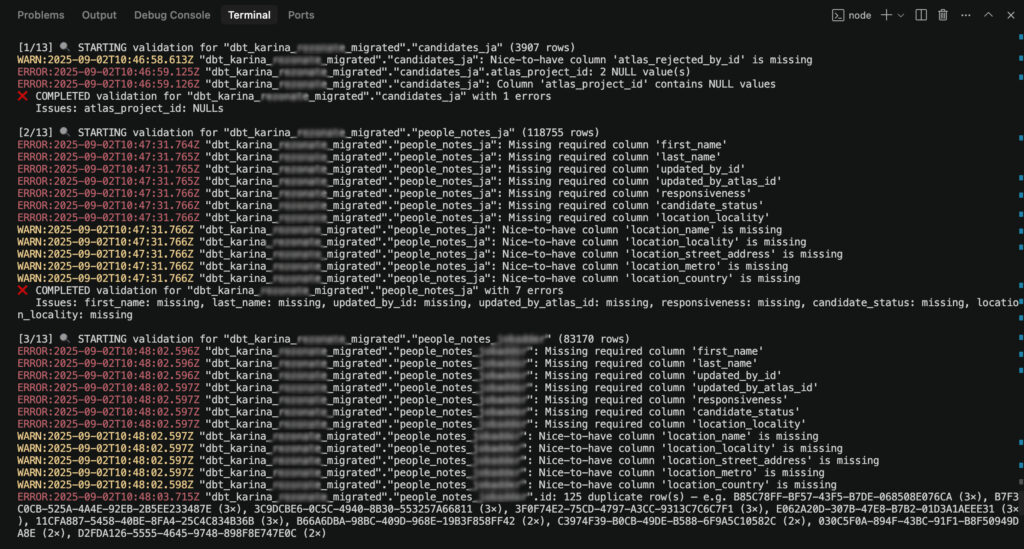
Step 6: Final deployment to Atlas
Once your team signs off on the staging review, we push your Salesforce data into the live Atlas environment. For current Atlas users, this includes merging with existing records. For new users, staging becomes your production system.
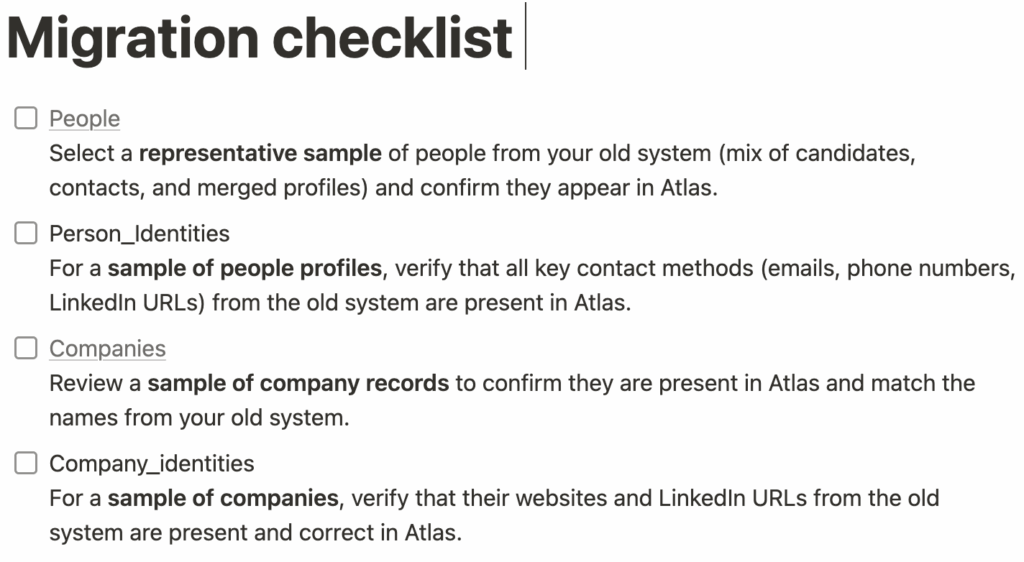
We index all records for full searchability and ensure that files and attachments are properly linked. Your migration from Salesforce is complete, and your team can begin using Atlas immediately.ting from your Salesforce environment to Atlas is far less complex than many agencies expect.
What recruitment agencies gain by switching
For recruiters, the choice to leave Salesforce isn’t just about moving systems. Rather, it’s about upgrading to software designed specifically for recruitment. An ATS (applicant tracking system) like Atlas gives agencies more than a database. It provides speed, accuracy, and automation that directly impact revenue.
Faster placements
- Candidate data is instantly searchable and structured through resume parsing.
- AI agents keep jobs moving by chasing feedback and sending reminders.
- Recruiters spend less time updating records and more time closing deals.
Cleaner data and better visibility
- Automated resume parsing ensures candidate profiles are complete.
- Notes and client feedback are captured automatically.
- Managers get real-time analytics on consultant performance and pipeline health.
Less admin, more candidate time
- The AI Note Taker records calls and interviews, removing the need for manual note entry.
- Consultants gain hours back each week to focus on conversations, not admin.
Stronger client relationships
- Executive Search Reports are generated instantly, keeping clients informed with polished updates.
- Consistent communication and quicker turnaround times strengthen trust with clients.
Switching from Salesforce to Atlas gives recruitment agencies a platform that reduces admin, increases productivity, and strengthens both client and candidate relationships.
Frequently Asked Questions (FAQs) about migrating from Salesforce to Atlas
No. The Atlas migration process is designed to transfer all your key Salesforce data, including candidates, job records, placements, notes, and attachments. Even custom objects and fields can be mapped into Atlas. Before go-live, data is verified with sample checks to make sure nothing is missing. You’ll retain full access to Salesforce during the transition for extra reassurance.
Most migrations are completed within three to six weeks. The exact timeline depends on factors such as data volume, the number of custom fields, and whether duplicate records need to be cleaned up. Atlas manages the process end-to-end, so your team can continue recruiting while the migration happens in the background.
Yes. Atlas supports what we call a “parallel run.” This means you can continue to access Salesforce while Atlas is being prepared with your data. Once you are happy with the imported records in Atlas, a final cutover is scheduled—usually over a weekend—to keep disruption to a minimum.
That’s very common. Many recruitment agencies rely on custom objects in Salesforce to represent candidates, jobs, or placements. The Atlas migration team is experienced in mapping these into the ATS, ensuring that your recruiters still have access to the information they rely on without needing complicated workarounds.
Every migration is managed by a dedicated Atlas migration team that works alongside you. You’ll also benefit from training sessions, data validation checks, and access to ongoing support after go-live. The goal is to make the transition smooth and stress-free for recruiters, so they can focus on clients and candidates instead of systems.
Next Steps: Switching from Salesforce to Atlas with Confidence
Salesforce is a strong CRM (customer relationship management system), but it was never built with recruitment agencies in mind. For recruiters, the daily reality is too much admin, too many workarounds, and not enough automation to support fast, people-focused hiring.
Atlas provides the alternative that agency recruiters have been waiting for. As a purpose-built ATS (applicant tracking system), it combines recruitment-specific workflows with AI-powered automation—from resume parsing to interview note-taking, executive search reports, and intelligent AI agents that keep jobs moving.
The result is a platform that reduces admin, improves candidate and client experiences, and helps recruiters focus on what matters most: making placements.
If your agency is ready to move beyond Salesforce, now is the time to explore Atlas. Book a demo today and see how Atlas can transform your recruitment process. Start here >>


